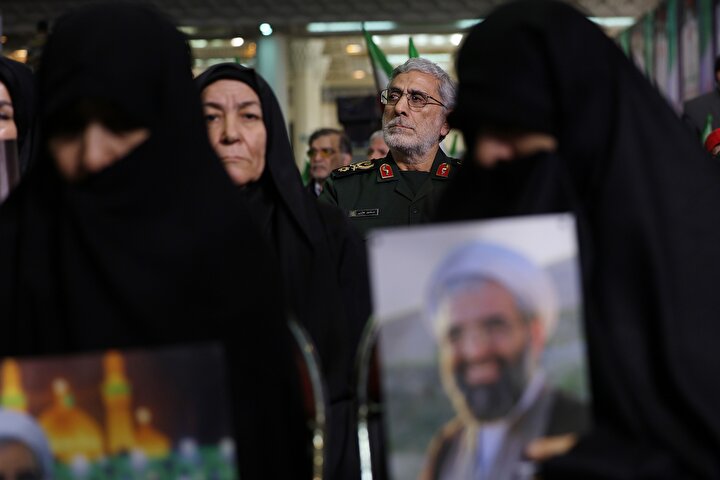For the Martyrdom Anniversary of Martyr Seyed Mojtaba Hashemi:
The Poem Martyr Hashemi Read for Medics
Navideshahed: One of the Holy Defense rescuer says: “Each time that martyr Hashemi would come to the hospital and he would see that the number of injured patients is so high in the unit and that we have faced with depression due to much working, he would try to sing poems loudly in order to boost our morale.”?

According to Fars News Agency's sacrifice and martyrdom reporter, martyr Seyed Mujtaba Hashemi, the commander of Fadaeeyan Islam Group of the Iran-Iraq war era was born on November 3, 1940.
Seyed Mujtaba Hashemi was married and he had two children. He was living in Tehran city. After many fighting in the Iran-Iraq war, eventually he was martyred on May 18, 1984 in Vahdat Street of Tehran by the terrorist agents of MEK.
Masoomeh Ramhormozi, one of the rescuers of the Holy Defense Era expresses a memory regarding martyr Hashemi and we read it together as follows:
***
Those war veterans would were working under supervision of martyr Hashemi would fight with the minimized level of facilities. Have we talked about them? Don’t they have any share in the war?
I can remember the time that we had been surrounded in Abadan city and we could hardly prepare breads and most of the comrades were hungry. The situation was really acute and special. Each time that martyr Hashemi would come to the hospital and he would see that the number of injured patients is so high in the unit and that we have faced with depression due to much working, he would try to sing poems loudly:
Saddam has got in trouble!
Khomeini is Imam!
Independency and Freedom!
Islamic Republic is the Final Message!
I liked this character (martyr Seyed Mojtaba Hashemi), because each time that he would come there, we would feel that someone has come there to grants us energy. After that he would talk with the rescuers and he would tell them: “I don’t want you to frown at all, I don’t want you to cry at all, we are the winners.”?
In one sentence I should say that each time that he would come to the hospital, he would make an excitement in the hospital and then he would leave. Where are these words written? No book has been written about him, because he was an ordinary person.
Also I should say that Mojtaba Hashemi was a person who had properties, shop and wealth in Tehran, but he had left all of these belongings and he had come to the battlefields…
The End
According to Fars News Agency's sacrifice and martyrdom reporter, martyr Seyed Mujtaba Hashemi, the commander of Fadaeeyan Islam Group of the Iran-Iraq war era was born on November 3, 1940. Seyed Mujtaba Hashemi was married and he had two children. He was living in Tehran city. After many fighting in the Iran-Iraq war, eventually he was martyred on May 18, 1984 in Vahdat Street of Tehran by the terrorist agents of MEK. Masoomeh Ramhormozi, one of the rescuers of the Holy Defense Era expresses a memory regarding martyr Hashemi and we read it together as follows: *** Those war veterans would were working under supervision of martyr Hashemi would fight with the minimized level of facilities. Have we talked about them? Don’t they have any share in the war? I can remember the time that we had been surrounded in Abadan city and we could hardly prepare breads and most of the comrades were hungry. The situation was really acute and special. Each time that martyr Hashemi would come to the hospital and he would see that the number of injured patients is so high in the unit and that we have faced with depression due to much working, he would try to sing poems loudly: Saddam has got in trouble! Khomeini is Imam! Independency and Freedom! Islamic Republic is the Final Message! I liked this character (martyr Seyed Mojtaba Hashemi), because each time that he would come there, we would feel that someone has come there to grants us energy. After that he would talk with the rescuers and he would tell them: “I don’t want you to frown at all, I don’t want you to cry at all, we are the winners.”? In one sentence I should say that each time that he would come to the hospital, he would make an excitement in the hospital and then he would leave. Where are these words written? No book has been written about him, because he was an ordinary person. Also I should say that Mojtaba Hashemi was a person who had properties, shop and wealth in Tehran, but he had left all of these belongings and he had come to the battlefields… The End




